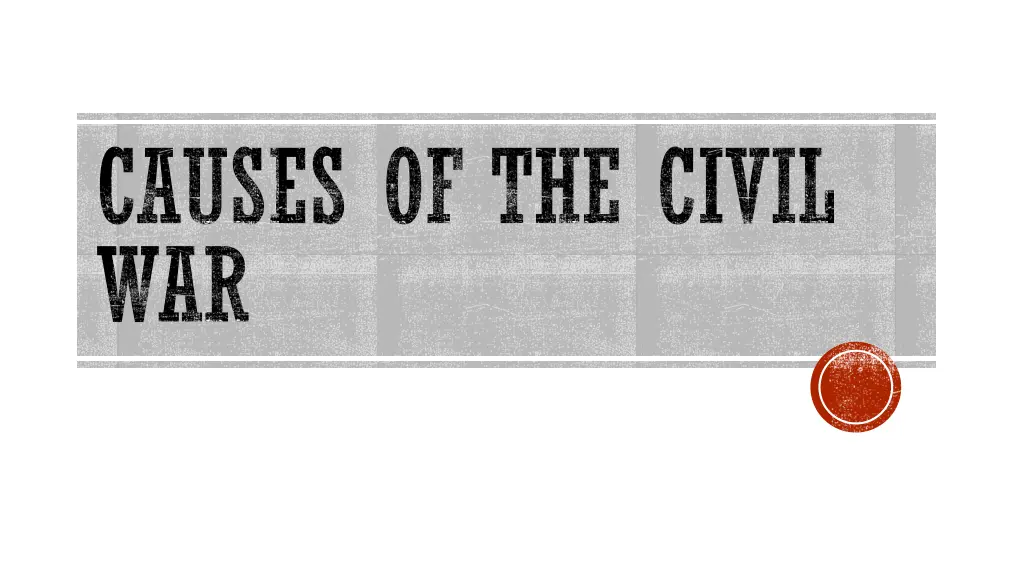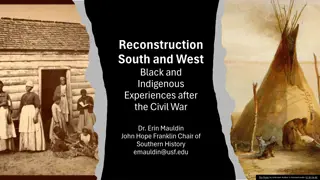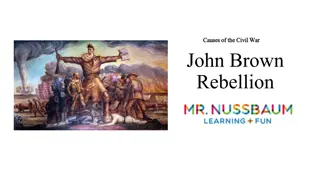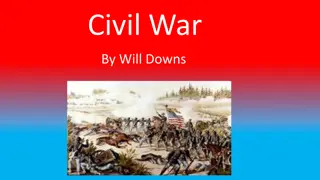
Causes of the Civil War and Compromises: A Historical Overview
Explore the primary causes of the Civil War including States' Rights, Nullification Crisis, Missouri Compromise, and Compromise of 1850. Understand the contentious debates that led to the nation's most significant conflict.
Download Presentation

Please find below an Image/Link to download the presentation.
The content on the website is provided AS IS for your information and personal use only. It may not be sold, licensed, or shared on other websites without obtaining consent from the author. If you encounter any issues during the download, it is possible that the publisher has removed the file from their server.
You are allowed to download the files provided on this website for personal or commercial use, subject to the condition that they are used lawfully. All files are the property of their respective owners.
The content on the website is provided AS IS for your information and personal use only. It may not be sold, licensed, or shared on other websites without obtaining consent from the author.
E N D
Presentation Transcript
STATES RIGHTS Practiced based on the belief that states had more authority than the federal government and could determine which laws they wanted to pass within their own state.
NULLIFICATION CRISIS This was a dispute over tariffs (taxes). The north supported high tariffs (dealt mainly with exports). The south was opposed to this tariff because it took away profits from cotton farmers (mainly imported goods).
States had the right to choose which federal laws to implement and which to ignore, or nullify (reject).
This idea was mainly practiced in the Southern states and led to heated political debates within Congress. South Carolina threatens to nullify the tariff and even possibly secede.
MISSOURI COMPROMISE The Missouri territory wanted to come into the Union as a slave state.
At the time, there were 11 free states in the north and 11 slave states in the south. This would upset the balance in congress.
Compromise: Maine came in as a FREE state and Missouri came in as a SLAVE state and the territory above the 36 line would be free
COMPROMISE OF 1850 After the gold rush, California had a population large enough to apply for statehood.
California wanted to come into the Union as a free state. But there were no slave states to maintain the balance.
Southern states were fearful that losing the power would one day give the North the opportunity to end slavery.
Results: 1.California is a FREE state * 2.Texas is a SLAVE state 3.New Mexico and Utah can decide for themselves using popular sovereignty. 4.Slavery is illegal in Washington D.C. 5.Fugitive Slave Act was passed: Northerners must return runaway slaves or face fines and jail.*
GEORGIA PLATFORM OF 1850 AND THE ROLE OF ALEXANDER STEPHENS The state of Georgia was still trying to decide if they would accept the terms of the compromise (Compromise of 1850). Finally Georgia approved of the compromise, led by Alexander Stephens. 2 parts: 1. Georgia would not secede from the Union. 2. They would support the Compromise of 1850.
ALEXANDER STEPHENS Was against seceding. He gave a stirring argument to the GA legislature Georgia will still vote to secede because of later events. Stephens will become the vice- president of the Confederate States of America.
KANSAS-NEBRASKA ACT Passed in 1854 Repealed the Missouri Compromise and permitted for the possibility of slavery being allowed above the 36 30 line. Kansas was being considered for statehood. Pro and anti-slavery supporters came to the state to vote for or against slavery in Kansas. There was widespread violence which became known as bleeding Kansas.
In 1861, Kansas as admitted as a free state. The Kansas- Nebraska act greatly divided the nation. It also destroyed the Missouri Compromise and the Compromise of 1850. Allowed for the rise of the Republican party, when the Whig party split into northern and southern factions.
DRED SCOTT CASE Dred Scott was a slave who sued for his freedom because his master moved to a free state (Illinois and Wisconsin) 1857- ended with a Supreme Court ruling that greatly favored the Southern view of slavery. The ruling stated that Scott was a slave and not a citizen therefore he had no right to sue. Also they stated that slaves were property just like furniture and could be taken anywhere.
ELECTION OF 1860 (LAST EVENT BEFORE THE WAR) Lincoln was republican. Most southerners were democrats. Lincoln=abolitionist and southerners were afraid he would outlaw slavery. Lincoln was not even on the ballot in the south. He only won by 40% of the vote. As soon as he was elected, southern states voted one by one to leave the Union. Georgia debated for 3 days and decided to leave the Union on January 19. 1861. Abraham Lincoln- Republican Breckinridge- Democratic John Bell- Constitutional Union Stephen Douglas-Democratic

![❤[PDF]⚡ Civil War Talks: Further Reminiscences of George S. Bernard and His Fel](/thumb/20551/pdf-civil-war-talks-further-reminiscences-of-george-s-bernard-and-his-fel.jpg)




















